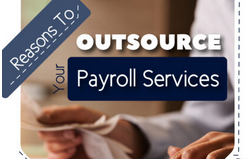If you are a business owner and highly value your peace of mind and time, consider outsourcing your payroll services.
…
Home » Blogs

If you are a business owner and highly value your peace of mind and time, consider outsourcing your payroll services.
…

With frequent tax laws and policy updates, it’s challenging to keep up with all the technical details.
As a result, a lot of people end up making tax planning mistakes.
…

When it comes to running a business in the United States, the owner generally has access to several different organizational forms to choose from. These business structures may vary from the simplest—a sole proprietorship—to the most complex, such as a C corporation. However, one type of structure that is exceptionally prevalent nowadays is the limited liability company (LLC). Continue reading to learn what an LLC is, how to form an LLC, and how it benefits business owners.
…
Is Forming an LLC Beneficial for Business Owners?Read More »

Is there a chance that your company may be entitled to tax refunds next year, resulting in additional cash flow? That’s great news. Now that you have the possibility of some extra money coming in, how should you spend it? Sure, you can take a trip, put money into an emergency fund, or purchase something you’ve had your eye on for a while. However, a tax refund is an excellent opportunity to expand your business if used wisely. Here’s how:
…

The profitability of your company entirely depends on how well you understand your federal, state and local taxes.
…

If you’re a new small business owner, you may be wondering what the phrase “doing your taxes” entails. Paying business taxes and filing returns can be quite confusing, especially when you’re doing it for the first time.
Here are a few commonly asked small business tax questions answered.
Businesses are required to file an annual tax return. Most businesses pay federal taxes on income earned during a twelve-month period. On the other hand, partnerships don’t have to pay income taxes but must file an annual information return reporting their share of profits or losses.
It’s imperative that you fully understand your local, state, and federal tax requirements before making any payments. This will ensure accuracy during the tax filing process and prevent missed deadlines. The type, amount, and method of tax payments depend on your business structure. Since the federal income tax system adopts a pay-as-you-go approach, you can expect quarterly tax payments that will compensate for your tax bill during your annual tax return.
Many small business owners struggle to conclude their deductible expenses when filing taxes. This can be tricky, as some personal and business expenses may overlap. The good news is that most business expenses are deductible, as long as you can prove they were made for crucial and reasonable business purposes.
Common deductible business expenses include those related to the equipment, transportation, office supplies, and technology used by employees. You may also be able to include business-related meals, travel, and purchases in these expenses. However, it’s best to reach out to a professional instead of assuming things on your own to avoid penalties.

Another aspect to keep in mind when paying taxes is how you classify your employees. The IRS has specific guidelines on how small business employees need to be classified, depending on the business relationship you have with them. You need to stick to these rules when determining if a worker is a permanent employee or an independent contractor.
Misclassifying workers can result in hefty fines and tax penalties. Working with a certified tax coach can help you evade these outcomes. Nidhi Jain is a certified public accountant and tax coach who provides comprehensive services for personal and business tax filing in Bay Area.
If you’re looking for a tax consultant in San Jose for your business, reach out to her today!


Outsourcing continues to play an essential role in the strategy of worldwide businesses; despite the upheaval caused by COVID-19, companies continue exploring foreign outsourcing, according to the Deloitte 2020 Global Outsourcing Survey findings. Payroll, which is a fundamental business activity, is often outsourced, especially by larger businesses. But why do companies outsource their payroll management? Continue reading to learn about the benefits of outsourcing payroll management.
…

5.4 million startups were registered in the US in 2021. Starting a business from scratch and then keeping it afloat is not easy. You are bound to make mistakes, and sometimes these mistakes can cost you big time. Most owners don’t want to outsource any services for their startups because they want to save money.
…

Many taxpayers ignore tax deadlines and pay their taxes at the end of the year, putting themselves in a difficult position.
However, if you file your taxes on time, you can relax, knowing you won’t have to deal with any end-of-year surprises.
…

If you’re the sole owner of a business, you might often think about when to turn your business into an LLC. Many people start as sole proprietors, and later want to switch to other viable business structures.
…
Make It Official: How and When to Convert Your Sole Proprietorship to an LLCRead More »

There are numerous ways to decrease the tax burden, with tax deductions and tax credits being the most popular ones. Many people confuse the differences in both phrases and frequently use them interchangeably. However, they’re two very distinct mechanisms. Both indeed decrease what needs to be paid in taxes, but tax deduction lowers the taxable income for the year.
Meanwhile, tax credit offers a dollar-for-dollar reduction of the owed tax, helping increase the refunds in some cases. A solid strategy made after consulting experienced tax planning advisors or tax accountants can help you save some cash. Let’s look at some of the key things that help differentiate tax credits from tax deductibles.
Simply put, tax credits directly decrease the tax amount owed, offering a dollar-for-dollar reduction. Qualifying for a $4000 tax credit would imply that you’ll save $4000 on the tax bill. If not, you’ll get a tax refund. For instance, if you qualify for a refundable tax credit of $1500 and you owe only $1000 in taxes, you’ll receive a tax refund for the $500 credit in excess on the tax bill.
However, not all tax credits are refundable. If the tax credit is non-refundable, it might reduce the tax bill down to $0, but even if the credit was worth more than what you owe, non-refundable credits don’t result in checks from the IRS for the difference. Common refundable tax credits include child tax credits and earned income tax credits. Child and dependent care credit and saver’s credit are some examples of non-refundable credits.
American opportunity tax credit is another tax credit that’s often listed as a partially refundable tax. It’s designed to help families pay for higher education expenses worth up to a limit. If you are or have a dependent who qualifies eligible student, and the tax credit is more than the owed taxes, a significant percentage of the leftover amount could be issued as a refund.

Tax deductions help lower the taxable income for the year. You can either claim the standard deduction or itemize the deductions. Standard deductions are the ones taxpayers can claim automatically, depending on their filing status. A married couple filing a joint tax return is considered one of the largest standard deductions. Conversely, itemizing refers to listing individual expenses you’d want to write off on the return. Itemizing typically makes sense when the total deductible expenses are higher than the standard deductions.
Some of the above-the-line and itemized deductions include mortgage loan interest, charitable donations, dental and medical expenses, contributions to health saving accounts or traditional IRAs, property and real estate taxes, educator expenses deduction, job search expenses, and more. Above-the-line deductions can be claimed separately even if you’re not itemizing the deductions. However, the ability to claim some deductions could be limited depending on factors like household income and filing status.
Tax brackets determine the tax rate paid on various chunks of the income. When the marginal tax system increased tax rates as income rises, tax deductions could lead to higher savings for those with higher incomes. Professional tax planning consultants at Nidhi Jain CPA can help you determine whether you should itemize deductions or take the standard deductions by comparing your allowable itemized deductions to the standard deduction amount.
Our tax accountants are CTC-certified and can help you with your tax filing chores while helping you limit your tax liabilities in several ways. We offer various tax preparation and advisory services for personal or business tax filing in Bay Area. People across the US rely on us for comprehensive bay area bookkeeping and accounting services, tax resolution services, payroll services, business formation, and back tax solutions.
You can also call or email us to discover how our cloud-based solutions and cutting-edge AccountantWS software can help you achieve your financial goals while remaining compliant cost-effectively.

Running a business and filing taxes each year is challenging.
It’s critical to plan ahead of time for tax season to make informed decisions at the end.
…

Whether you’ve just welcomed a new member to the family or shifted into your dream house, your bank is liable to reflect the changes in various ways. Many of life’s most momentous events can affect your finances, some more unexpectedly than others. Ever wondered how significant life events could impact your tax situation? Here’s what you need to know.
…

Managing a small business isn’t for the faint of heart! Even if you’ve found success when it comes to turning your terrific idea into a reality with people clamoring for your products or services, the financial obstacles associated with running small businesses can escalate rapidly.
…
Top Financial Challenges for Small Businesses and Ways to Overcome ThemRead More »

CPA, CTC, CA, Master of Commerce (India)
This e-mail and any files transmitted with it are for the sole use of the intended recipient(s) and may contain confidential and privileged information. If you are not the intended recipient(s), please reply to the sender and destroy all copies of the original message. Any unauthorized review, use, disclosure, dissemination, forwarding, printing or copying of this email, and/or any action taken in reliance on the contents of this e-mail is strictly prohibited and may be unlawful.
Nidhi Jain is a CPA and Indian CA providing services in US and India. We serve Bay area including South Bay, Sunnyvale, San Jose, Milpitas, Fremont, East Bay, Trivalley, Pleasanton, Livermore, Dublin and San Ramon. We specialize and have extensive experience to best serve our clients with complex tax situations like: Asset Inheritance and Gift from Foreign countries, Repatriating Money from Foreign countries, FBAR Filing (Foreign Bank Account Reporting), Incorporation of US Entity by International Clients, International Tax reporting and compliance of selling property abroad, Tax Planning and Advisory Service
© 2025 Nidhi Jain CPA. All Rights Reserved